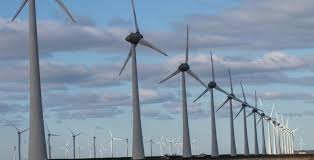Bulgaria: Northeast town resists giant wind power project that WPD revived

Sofia: Germany-based wpd is trying to amend and merge two old wind power projects in General Toshevo in northeast Bulgaria. The local council is against it. The company submitted a request to allow 10 MW turbines instead of 3 MW.
Bulgaria is deciding whether wpd needs to conduct an environmental impact assessment study for its planned wind park in General Toshevo. The location in Dobrich province in northeast Bulgaria spans the territory of the villages Zhiten, Snop, Gradini, Pchelarovo and Dabovik.
The country’s total installed wind power capacity is 703 MW, according to the International Renewable Energy Agency (IRENA). Not a single wind park has been commissioned since 2012, amid administrative barriers and legal uncertainty. After the local authority in nearby Vetrino effectively blocked CWP’s giant wind power project last year, the Municipal Council of General Toshevo now declared it opposes wpd’s investment.
It expressed support to the local population and firms resisting the project. They stressed that they want to protect fertile land in the region of southern Dobruja. It hosts a group of small wind farms built in the first wave. The municipality pointed to its ten-year renewables plan and said wpd’s initiative doesn’t align with it.
Project firm Wpd Wind 1 requested from General Toshevo to change its spatial plan. It wants to install 10 MW turbines, compared to the current 3 MW limit. The German company asked to raise the maximum allowed tower height to 200 meters from 140 meters and the total height to 300 meters from up to 196 meters, Pro News Dobrich reported.
Wpd also plans wind farms in Balchik and Dobrichka in the same area, among its other projects, the article adds.
The General Toshevo investment is now a combination of two old proposals, Svoboda 1 and Mizia 1, for an overall 70 turbines or 35 each, according to Capital.bg. The Bulgarian news website wrote that the initially proposed capacity was 210 MW and that the plan grew to more than 400 MW.
Costs are seen at up to EUR 511 million, the media outlet added. It learned that no state aid or preferential status are expected at this stage.
According to the original spatial plan, the turbines and their foundations would take up 44.6 hectares or less than 1% of agricultural land in the municipality. Amending the local spatial plan is under negotiation to secure more land as the company is attempting to accomodate larger turbines.
In Bulgaria, there were also several cases of backlash against solar power projects over the past few years. Farmers and environmentalists are insisting that agricultural land must be exempted from such investments.
The country is in a continuous political crisis for several years now, so the legislative response has been slow. There were even arrests for illegally lowering the quality grades of numerous agricultural land lots to enable the construction of solar power plants.
In neighboring Serbia and, in fact, near the joint border, the Ministry of Environmental Protection recently abolished a wind park project for the first time.





